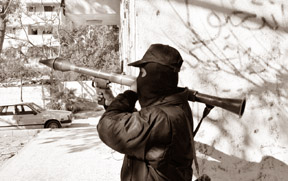|
dailynews |
|
|
|
|
|
OTHER LINKS |

|

|

|
Spectre of civil war haunts Palestinian areas
If the thorny issues at the heart of the call for the polls go unaddressed by the leadership of the rival groups, the chances are that the political polarization between the main power contenders in the Palestinian Authority areas would take on an increasingly bloody dimension. The current strife in the region, jeopardises hopes of shoring-up an administration of national unity in the Palestinian areas, which when proposed held out the promise a few months back of ending the rift between the principal arms of the Palestinian Executive - President Abbas and the Hamas-led government which came to power on a popular mandate in March this year.
Although generally viewed as hardline and uncompromising on Middle-East conflict issues, Hamas has over the months shown signs of adjusting to political realities in the region and of following a less confrontational policy in relation to Israel, although it is yet to recognise Israel. Therefore, the current round of strife between the Fatah and Hamas groups should be seen as threatening the few gains which have been achieved in the recent past by way of containing the Middle East conflict. As should be expected, these developments on the ground have an international dimension which should not go unaddressed. This consists in the backing Abbas is currently enjoying from the West who are inclining to a "two-state" solution to the Middle East conflict. In fact, British Premier Tony Blair is currently visiting the Palestinian areas and has called for international support for President Abbas, who is widely seen as a political moderate. Early next year, the US Secretary of State Condolleezza Rice too would visit the Middle East in a diplomatic tour which would showcase US interest in Middle East developments. What has precipitated Abbas' decision to call for fresh elections is mainly the financial boycotting of the Hamas regime by the West, which in turn has forced a financial crisis on the fledgling administration. Besides, efforts at forging a national unity government between the Fatah and Hamas groups have foundered. Abbas was quoted saying in justification of his decision to call for fresh elections that "early presidential and parliamentary elections" would enable people to "decide on an acceptable programme to preserve their national interest .... and put an end to the siege and crisis." While a policy of national reconciliation and moderation needs to be pursued by the warring groups in the Palestinian areas or risk plunging the region into an Iraq-type wasting conflagration, the West needs to follow a policy of rapprochement with the Hamas administration. An effort by the West to internationally isolate the Hamas government would only further radicalize it and incline it to perpetuate a hardline policy on the Middle East conflict. Besides, a financial boycott of the Hamas government by the West would only increase the hardships of the Palestinian public and have the effect of radicalizing the latter too. An increasingly anti-Western outlook on the part of the Hamas government and the Palestinian people would prove an obstacle to bringing a political settlement to the Middle East conflict. So, a through - going rethink is necessary on the part of the West in relation to radical regimes, such as that led by Hamas. Rather than relegate them to international outcast status, the West would do better to dialogue with them with the aim of narrowing ideological and other vital differences. Admittedly, this is no easy task. It is certainly no quick - fix solution to the intractable problem the Middle East is presenting. Nevertheless, there is no getting away from the need for a "civilizational dialogue" between the West and its detractors for the purpose of taking the war-hit parts of the world along the path of reconciliation. A confrontational approach on the part of the actors would only aggravate divisions. |
![[Global Scrutiny]](Global%20Scrutiny.jpg) THORNY ISSUES: A call for fresh elections in the Palestinian
Authority areas by Palestinian President Mahmoud Abbas has triggered
fierce and prolonged armed clashes between the Fatah and Hamas groups
and raised the spectre of civil war in the region.
THORNY ISSUES: A call for fresh elections in the Palestinian
Authority areas by Palestinian President Mahmoud Abbas has triggered
fierce and prolonged armed clashes between the Fatah and Hamas groups
and raised the spectre of civil war in the region. 








